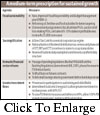Barely 16 months ago, the Economic Survey for 2007-08 had asserted that India?s growth rate is unlikely to slip below 9% in the ?next few years.? On Thursday, when the Survey for 2008-09 was tabled by finance minister Pranab Mukherjee, it reported a GDP growth of 6.7% after stimulus measures worth 3.5% of GDP were added. For 2009-10, the Survey sets a growth target of 7%, which, Mukherjee said, could be surpassed ?if luck favours? ? a far cry from the confidence in the last Survey.
The Survey, tabled in the Lok Sabha amidst protests against the fuel price hike announced on Wednesday, however, stressed that it is possible to return to the 8.5-9% growth path seen in recent years. But this would need as much political courage from the UPA?s top leaders as ?luck,? since the Survey penned by the finance ministry?s key economic personnel calls for far-reaching reforms across sectors as the best medium term response to the global financial crisis.
As expected, with fiscal deficit rising to 6.2% of the GDP in 2008-09 and FRBM targets going off-track, the Survey has stressed on ?revitalising? the Centre?s disinvestment programme as it?s a more feasible way to cut deficit than levying new taxes. So, to generate at least Rs 25,000 crore per year and shave off half a percentage point from the deficit, the Survey has mooted that all unlisted PSUs be listed through 10% stake sales, all loss-making PSUs be ?auctioned off?, and a 5-10% stake sale in profitable non-navratnas.
 On this front, the Survey?s confidence may stem from Prime Minister Manmohan Singh?s statement that ?money does not grow on trees? in response to DMK?s rhetoric against disinvestment. The Survey has also called for a fresh approach to the Fiscal Responsibility and Budget Management Act of 2005, calling for a new improved sequel to the law. But that?s not the only reform on the Survey?s wish-list, which, chief economic advisor Arvind Virmani stressed, must be considered over a five year period.
On this front, the Survey?s confidence may stem from Prime Minister Manmohan Singh?s statement that ?money does not grow on trees? in response to DMK?s rhetoric against disinvestment. The Survey has also called for a fresh approach to the Fiscal Responsibility and Budget Management Act of 2005, calling for a new improved sequel to the law. But that?s not the only reform on the Survey?s wish-list, which, chief economic advisor Arvind Virmani stressed, must be considered over a five year period.
Admitting that India?s tax regime has regressed in recent years, thanks to multiple new taxes, the Survey has called for a review and phase-out of the Fringe Benefit Tax, Securities Transaction Tax and the Commodities Transaction Tax as well as cesses and surcharges. It has also stressed that GST must be introduced as per the original schedule of April 1, 2010 and states must be encouraged to scrap stamp duties. The Direct Tax Code, that has been languishing for over a year now, must be introduced to create a ?neutral? corporate tax regime, the Survey noted.
Though inflation is not a concern right now, the Survey has asked for improving food production and a calibrated absorption of excess liquidity in the market to avoid a return to inflationary trends.
To counter slowing capital inflows and encourage investments into fund-starved sectors, the Survey said it?s the time to allow 100% FDI in multi-format retailing, starting with food retail, where foreign investment can help create non-existent cold supply chains. It has also mooted increasing the FDI limit in defence and insurance from the current 26% to 49%. It has also called for amending the Atomic Energy Act to allow 49% FDI in nuclear energy and 100% FDI on a case by case basis in high technology, strategic defence goods, services and systems that help eliminate import dependence.
The Survey has also called for deregulating oil, drug, sugar and fertiliser prices, while converting any producer subsidies into ?direct consumer subsidies.? In another big booster for India Inc?s competitiveness, the Survey has called for sweeping labour law reforms?which include allowing companies to hire and fire workers without government permission. The PM has often lamented that labour law rigidities are depriving India?s youth of employment opportunities.
Surprisingly, there?s little mention of the counter-cyclical public investment in infrastructure sectors.
